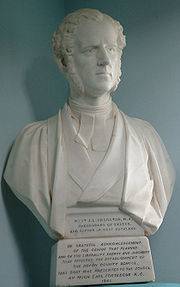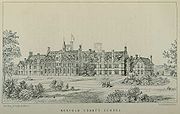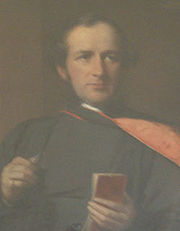
Joseph Lloyd Brereton
Encyclopedia

Prebendary Joseph Lloyd Brereton, (19 October 1822 - 15 August 1901), was an educational reformer and writer, who founded inexpensive schools for the education of the middle classes. Through his work and writings he influenced others to make similar foundations.
Life
Brereton was born on 19 October 1822 at Little MassinghamLittle Massingham
Little Massingham is a small village and civil parish in the English county of Norfolk. It is located on the northern boundary of Great Massingham.It covers an area of and had a population of 74 in 37 households as of the 2001 census....
Rectory, near King's Lynn
King's Lynn
King's Lynn is a sea port and market town in the ceremonial county of Norfolk in the East of England. It is situated north of London and west of Norwich. The population of the town is 42,800....
. He was third son of eleven children of Charles David Brereton (1790–1868), for forty-seven years rector of Little Massingham, by his wife Frances (1796–1880), daughter of Joseph Wilson of Highbury Hill, Middlesex, and Stowlangtoft Hall, Suffolk. The father was an influential writer on poor law and agricultural questions between 1825 and 1828. Brereton's youngest brother, Robert Maitland Brereton
Robert Maitland Brereton
Robert Maitland Brereton was an English railway engineer in India. In the United States he helped secure the first Act of Congress for the irrigation of California.-Engineering training:...
, became a railway and civil engineer.
Brereton was educated at Islington proprietary school under Dr. John Jackson
John Jackson (bishop)
John Jackson was a British divine and a Church of England bishop for 32 years.-Career:Jackson was appointed rector of St James, Westminster, London in 1846....
, afterwards bishop of London, and at Rugby under Dr. Thomas Arnold
Thomas Arnold
Dr Thomas Arnold was a British educator and historian. Arnold was an early supporter of the Broad Church Anglican movement...
(1838–41). He gained a scholarship at University College, Oxford
University College, Oxford
.University College , is a constituent college of the University of Oxford in England. As of 2009 the college had an estimated financial endowment of £110m...
, in 1842, obtained the Newdigate prize
Newdigate prize
Sir Roger Newdigate's Prize is awarded to students of the University of Oxford for Best Composition in English verse by an undergraduate who has been admitted to Oxford within the previous four years. It was founded by Sir Roger Newdigate, Bt in the 18th century...
for a poem on the Battle of the Nile in 1844, and graduated B.A. in 1846 and M.A. in 1857. During his university education he was granted leave on account of illness. It was during this time he started employment as a private tutor with wealthy families, a practice he continued for many years.
Taking holy orders, Brereton held curacies at St. Edmund's in Norwich, St. Martin's-in-the-Fields, and St. James's, Paddington (1847–50). While in London and with the help from his family, he edited a quarterly journal, The Anglo Saxon, which contained articles celebrating English culture and history for consumption in England and throughout the English speaking world. The popular author, Martin Farquhar Tupper
Martin Farquhar Tupper
Martin Farquhar Tupper was an English writer, and poet, and the author of Proverbial Philosophy.-Early life:...
was a frequent contributor. The journal promoted and reported on the grand celebration held on 25 October 1849 at Wantage
Wantage
Wantage is a market town and civil parish in the Vale of the White Horse, Oxfordshire, England. The town is on Letcombe Brook, about south-west of Abingdon and a similar distance west of Didcot....
of the millennium of the birth of Alfred the Great
Alfred the Great
Alfred the Great was King of Wessex from 871 to 899.Alfred is noted for his defence of the Anglo-Saxon kingdoms of southern England against the Vikings, becoming the only English monarch still to be accorded the epithet "the Great". Alfred was the first King of the West Saxons to style himself...
.
From 1852 to 1867 Brereton was rector of West Buckland, Devon
West Buckland, Devon
West Buckland is a small village located east-south-east of Barnstaple in North Devon, England. The hamlet of Elwell lies to its north-east....
, and in 1867 he took over from his father as rector of Little Massingham, where he remained for the rest of his life. In 1882 Brereton, with his brother, General John Alfred Brereton, was severely injured in a railway accident between Cambridge
Cambridge
The city of Cambridge is a university town and the administrative centre of the county of Cambridgeshire, England. It lies in East Anglia about north of London. Cambridge is at the heart of the high-technology centre known as Silicon Fen – a play on Silicon Valley and the fens surrounding the...
and Ely
Ely, Cambridgeshire
Ely is a cathedral city in Cambridgeshire, England, 14 miles north-northeast of Cambridge and about by road from London. It is built on a Lower Greensand island, which at a maximum elevation of is the highest land in the Fens...
, which interrupted for some years his public work.
On 25 June 1852 Brereton married Frances, daughter of William Martin, rector of Staverton, Devon
Staverton, Devon
Staverton is a village and civil parish in the South Hams of Devon, England consisting 297 households and a population of 717 .The village has one pub/inn called 'The Sea Trout' which is located in the heart of the village....
, and they had five sons and six daughters. Brereton died on 15 August 1901, and was buried in Little Massingham churchyard.
Educational reform
Brereton's interest in educational reform among the agricultural and middle classes was stimulated by his father's studies of the Poor Laws and also by the influence of Dr. Arnold at Rugby. While rector of West Buckland he, with Hugh Fortescue, 2nd Earl Fortescue, lord-lieutenant of Devonshire, and his sonHugh Fortescue, 3rd Earl Fortescue
Hugh Fortescue, 3rd Earl Fortescue , known as Viscount Ebrington from 1841 to 1861, was a British peer and occasional politician.He entered the House of Commons in 1841 as a member for Plymouth...
, afterwards third earl, established in 1858 at West Buckland the farm and county school (which was soon named the Devon county school, and in 1912 was renamed West Buckland School
West Buckland School
West Buckland School is an English public school located on the outskirts of the village of West Buckland on the edge of Exmoor, 9 miles east of Barnstaple, Devon. It comprises a senior school , preparatory school and a nursery...
), to supply education suitable for farmers' sons. The object was to provide public boarding-schools, with liberal and religious education, at fees large enough to cover the cost of board and tuition and to return a fair interest on capital invested, but at a fraction of what was charged by public schools
Public School (UK)
A public school, in common British usage, is a school that is neither administered nor financed by the state or from taxpayer contributions, and is instead funded by a combination of endowments, tuition fees and charitable contributions, usually existing as a non profit-making charitable trust...
. In recognition of his work in Devon, Brereton was made, in 1858, prebendary of Exeter Cathedral.
In contrast to the work of Nathaniel Woodard
Nathaniel Woodard
Nathaniel Woodard was a priest in the Church of England. He founded 11 schools for the middle classes in England whose aim was to provide education based on sound principle and sound knowledge, firmly grounded in the Christian faith...
, who also founded schools for the middle classes, Brereton's foundations were not high church
High church
The term "High Church" refers to beliefs and practices of ecclesiology, liturgy and theology, generally with an emphasis on formality, and resistance to "modernization." Although used in connection with various Christian traditions, the term has traditionally been principally associated with the...
. Indeed, although religious instruction and worship were part of the curriculum at Brereton's schools the low church
Low church
Low church is a term of distinction in the Church of England or other Anglican churches initially designed to be pejorative. During the series of doctrinal and ecclesiastic challenges to the established church in the 16th and 17th centuries, commentators and others began to refer to those groups...
approach was less discouraging to non-conformist elements of the middle classes. Secondly, the main feature of the scheme was that the county rather than the diocese should be the unit of the area of organisation, and that upon the county basis the whole scheme of national education should be co-ordinated. Finally, Brereton did not rely wholly on endowments as did Woodard, but he operated mainly on a proprietary basis, forming companies of investors to raise the capital needed to found his schools.

North Elmham
North Elmham is a village and civil parish in the English county of Norfolk.It covers an area of and had a population of 1,428 in 624 households as of the 2001 census. For the purposes of local government, it falls within the district of Breckland....
. His next step was to connect the county school system with the universities. After an unsuccessful attempt at Oxford, he founded at Cambridge in 1873 a 'county' college, which was named Cavendish College, after the chancellor of the university, the Duke of Devonshire
William Cavendish, 7th Duke of Devonshire
William Cavendish, 7th Duke of Devonshire KG, PC , styled as Lord Cavendish of Keighley between 1831 and 1834 and known as The Earl of Burlington between 1834 and 1858, was a British landowner, benefactor and politician.-Background and education:Cavendish was the son of William Cavendish, eldest...
. Brereton described his scheme in his book County Education. Cavendish College was instituted as a public hostel of the university, students in residence being eligible for a university degree. The undergraduates were younger than was customary, and the cost of board and tuition, which was covered by an inclusive charge of eighty guineas a year, was much lower than in the established colleges. The venture received educational and ecclesiastical support. However, the proprietary principle was not welcomed by some, and the public schools withheld their recognition. Other factors were the distance of the college from the centre of Cambridge, (more than 1 mile), and inferior accommodation. The scheme proved financially unsuccessful, and the college was dissolved in 1892. The buildings were sold in 1895 and were used as a training college, Homerton College, for women teachers, which in 2001 finally became a full college of Cambridge University.
In 1881, Brereton formed the Graduated County Schools Association, whose aim was the establishment of self-supporting schools and colleges for girls and women, the last step in his practical scheme for a national system of county education. The association collapsed in 1887 leaving Brereton with large debts.
A contributing factor in the failure of some of his schools was the agricultural depression in the 1880s and the competition which arose as a result of the increasing responsibility for secondary education being assumed by counties, e.g. the Free Education Act of 1891 provided some access to low cost secondary education. A key feature of all Brereton's schemes was the proprietary principle. Significant foundation funds were to be raised from investors arather than from charitable endowments. In the end this was a millstone too great for some schools to sustain in times of hard competition.
Rural affairs and railways
Brereton was interested in agricultural questions, and while in Devon founded in 1854 the Barnstaple Farmers' Club, of which he was president. Later he was president of the west Norfolk chamber of agriculture. In north Devon his interest in rural prosperity was marked by many permanent works of reform and improvement, and by his efforts he helped to bring the railway from Taunton to Barnstaple, a line known as the Devon and Somerset RailwayDevon and Somerset Railway
The Devon and Somerset Railway was a branch line from near in Somerset to in North Devon. It was operated from the outset by the Bristol and Exeter Railway which became part of the Great Western Railway on 1 January 1876.-History:...
and afterwards absorbed into the Great Western Railway
Great Western Railway
The Great Western Railway was a British railway company that linked London with the south-west and west of England and most of Wales. It was founded in 1833, received its enabling Act of Parliament in 1835 and ran its first trains in 1838...
. Similar efforts in west Norfolk led to the Lynn and Fakenham Railway, which was subsequently extended to Norwich, Cromer, and Yarmouth.

Portraits
A portrait of Brereton as a boy with his maternal grandfather, Joseph Wilson, was painted by Sir David WilkieDavid Wilkie (artist)
Sir David Wilkie was a Scottish painter.- Early life :Wilkie was the son of the parish minister of Cults in Fife. He developed a love for art at an early age. In 1799, after he had attended school at Pitlessie, Kettle and Cupar, his father reluctantly agreed to his becoming a painter...
. A second portrait, by George Richmond
George Richmond
For the 21st century educator see George H. RichmondGeorge Richmond was an English painter.George Richmond was the father of the painter William Blake Richmond as well as the grandfather of the naval historian, Admiral Sir Herbert Richmond.A keen follower of cricket, Richmond was noted in one...
, R.A., with a companion portrait of his wife, was exhibited at the Royal Academy
Royal Academy
The Royal Academy of Arts is an art institution based in Burlington House on Piccadilly, London. The Royal Academy of Arts has a unique position in being an independent, privately funded institution led by eminent artists and architects whose purpose is to promote the creation, enjoyment and...
in 1868; both are now at West Buckland School, where there is also a bust of Brereton was placed there in 1861 by Hugh, Earl Fortescue.
Publications
His writings, beside pamphlets, and sermons, include:- County Education: a Contribution of Experiments, Estimates and Suggestions (1874)
- The Higher Life, (1874), a blank verse exposition of New Testament teaching
- Musings in Faith and other Poems, (1885)
Sources
- The Alfred Jubilee, The Times (29 October 1849, p 8)
- Obituary, The Times, (17 August 1901)
- Owen, W.B.: in Dictionary of National Biography, (1912)
- Honey, J.R.deS.: Tom Brown's Universe, (1977)
- Searby, P.: in Oxford Dictionary of National Biography, (2004)

